
Sorghum is a genus of about 25 species of flowering plants in the grass family (Poaceae). Some of these species are grown as cereals for human consumption and some in pastures for animals. One species, Sorghum bicolor, was originally domesticated in Africa and has since spread throughout the globe. Seventeen of the 25 species are native to Australia, with the range of some extending to Africa, Asia, Mesoamerica, and certain islands in the Indian and Pacific Oceans. One species is grown for grain, while many others are used as fodder plants, either cultivated in warm climates worldwide or naturalized in pasture lands. Sorghum is in the subfamily Panicoideae and the tribe Andropogoneae.

Eragrostis is a large and widespread genus of plants in the grass family, found in many countries on all inhabited continents and many islands.
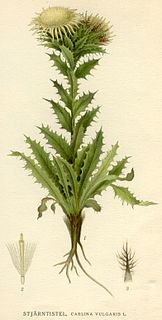
Carlina vulgaris, the carline thistle, is a plant species of the genus Carlina.
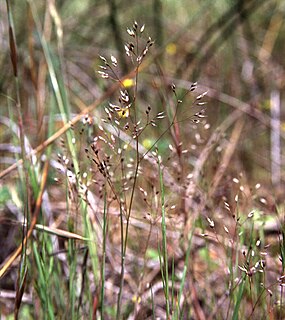
Aira is a genus of Old World plants in the grass family, native to western and southern Europe, central and southwest Asia, plus Africa.

Cocculus is a genus of 11 species of woody vines and shrubs, native to warm temperate to tropical regions of North America, Asia and Africa. The common name moonseed is also used for the closely related genus Menispermum. The related Indian berry is known as "Cocculus Indicus" in pharmacology.

Margaritaria is a plant genus of the family Phyllanthaceae first published as a genus in 1782. It is the smallest pantropical genus of the Phyllanthaceae and, formerly, of the Euphorbiaceae, widely distributed in tropical and subtropical regions of Asia, Africa, Australia, North and South America, and various oceanic islands.

Arctotheca calendula is a plant in the sunflower family commonly known as capeweed, plain treasureflower, cape dandelion, or cape marigold because it originates from the Cape Province in South Africa. It is also found in neighboring KwaZulu-Natal.
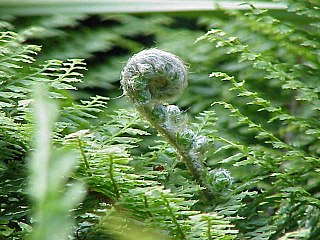
Polystichum is a genus of ferns in the family Dryopteridaceae, subfamily Dryopteridoideae, according to the Pteridophyte Phylogeny Group classification of 2016. The genus has about 500 species and has a cosmopolitan distribution. The highest diversity is in eastern Asia, with about 208 species in China alone; the region from Mexico to Brazil has at least 100 additional species; Africa, North America, and Europe have much lower diversity. Polystichum species are terrestrial or rock-dwelling ferns of warm-temperate and montane-tropical regions. They are often found in disturbed habitats such as road cuts, talus slopes, and stream banks.

Juniperus procera is a coniferous tree native to mountainous areas in Africa and the Arabian Peninsula. It is a characteristic tree of the Afromontane flora.
Thomandersia is the sole genus in the Thomandersiaceae, an African family of flowering plants. Thomandersia is a genus of shrubs and small trees, with six species native to Central and West Africa.

Pteris vittata, commonly known variously as the Chinese brake, Chinese ladder brake, or simply ladder brake, is a fern species in the Pteridoideae subfamily of the Pteridaceae. It is indigenous to Asia, southern Europe, tropical Africa and Australia. The type specimen was collected in China by Pehr Osbeck.

Trema orientale is a species of flowering tree in the hemp family, Cannabaceae. It is known by many common names, including charcoal-tree, Indian charcoal-tree, pigeon wood, Oriental trema, and in Hawaii, where it has become naturalized, gunpowder tree, or nalita. It has a near universal distribution in tropical and warm temperate parts of the Old World, with a range extending from South Africa, through the Middle East, the Indian subcontinent and southern China to Southeast Asia and Australia.
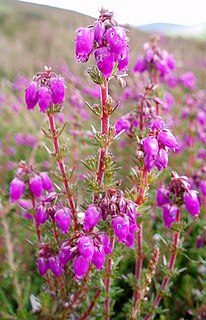
Edward (Ted) George Hudson Oliver, is a South African Botanist and author. He is an expert in heathers. He has discovered and named several species. Oliver is the recognized world authority on the subfamily Ericoideae.

Bothriochloa bladhii is a Neotropic grass in the family Poaceae, found primarily in tropical Africa, and tropical and temperate Asia, and Australia. The type specimen was collected from China by Finnish botanist Peter Johan Bladh. The name of Bladh is honored in the specific epithet.

Irvingia is a genus of African and Southeast Asian trees in the family Irvingiaceae, sometimes known by the common names wild mango, African mango, bush mango, dika, mbukpap uyo or ogbono. They bear edible mango-like fruits, and are especially valued for their fat- and protein-rich nuts.

Tropico is a short film "based on the Biblical story of sin and redemption", starring Lana Del Rey as Eve and Shaun Ross as Adam. Written by Del Rey and directed by Anthony Mandler, the film premiered at the Cinerama Dome in Hollywood, California on December 4, 2013, before being uploaded to Del Rey's official Vevo account the following day. It features the songs "Body Electric", "Gods & Monsters", and "Bel Air", all are taken from Del Rey's 2012 EP Paradise. An EP of the film's name was also released the same month to the iTunes Store. It includes the film itself along with the three songs.
Tropicos is an online botanical database containing taxonomic information on plants, mainly from the Neotropical realm. It is maintained by the Missouri Botanical Garden and was established over 25 years ago. The database contains images and taxonomical and bibliographical data on more than 4.2 million herbarium specimens. In addition, it contains data on over 49,000 scientific publications. The database can be queried in English, French, and Spanish. The oldest records in the database go back to 1703.
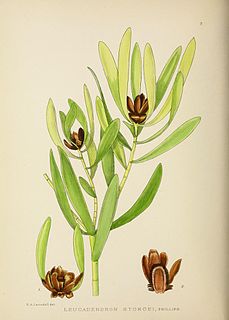
Leucadendron microcephalum, common name oilbract conebrush, is a dioecious, single-stemmed, South African shrub belonging to the family Proteaceae, endemic to the Western Cape and growing from sea level to 1,200 m (3,900 ft). It is one of some 200 species in the genus, all confined to South Africa.
Plants of the World Online is an online database published by the Royal Botanic Gardens, Kew. It was launched in March 2017 with the ultimate aim being "to enable users to access information on all the world's known seed-bearing plants by 2020". The initial focus was on tropical African Floras, particularly Flora Zambesiaca, Flora of West Tropical Africa and Flora of Tropical East Africa.
Protea nubigena, commonly known as cloud sugarbush, is a very rare species of a flowering shrub belonging to the Protea genus. It is endemic to KwaZulu-Natal, South Africa and is found in the uKhahlamba Basalt Grassland within the Royal Natal National Park, near Mont-Aux-Sources, at an altitude of about 2,250 metres (7,380 ft) in well-drained, humus-rich soil on shaded slopes.
















